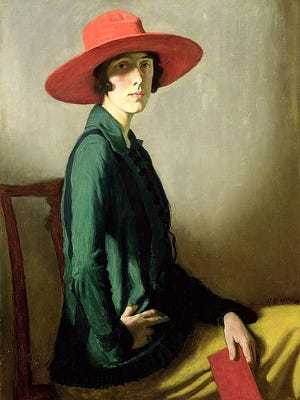I just miss you, in a quite simple desperate human way
The following letter can be found in the book, Letters of Note: Love.

English novelist Vita Sackville-West’s marriage to Sir Harold Nicolson was the very definition of an open one, with both partners happily enjoying extramarital relationships for much of the 49 years they spent together. In the early-1920s, Vita began what was to be her most famous affair, with Virginia Woolf, the hugely influential author responsible for such classics as Mrs Dalloway and Orlando, the latter of which was based, in part, on Vita’s life. In January of 1926, Vita reluctantly departed London to join her husband, then a diplomat working in Persia, for four long months; on the 21st, as she travelled by train, Vita wrote a longing letter to the lover she had left behind.
January 21
Milan
I am reduced to a thing that wants Virginia. I composed a beautiful letter to you in the sleepless nightmare hours of the night, and it has all gone: I just miss you, in a quite simple desperate human way. You, with all your un-dumb letters, would never write so elementary a phrase as that; perhaps you wouldn't even feel it. And yet I believe you'll be sensible of a little gap. But you'd clothe it in so exquisite a phrase that it would lose a little of its reality. Whereas with me it is quite stark: I miss you even more than I could have believed; and I was prepared to miss you a good deal. So this letter is just really a squeal of pain. It is incredible how essential to me you have become. I suppose you are accustomed to people saying these things. Damn you, spoilt creature; I shan't make you love me any the more by giving myself away like this—But oh my dear, I can't be clever and stand-offish with you: I love you too much for that. Too truly. You have no idea how stand-offish I can be with people I don't love. I have brought it to a fine art. But you have broken down my defences. And I don't really resent it.
However I won't bore you with any more.
We have re-started, and the train is shaky again. I shall have to write at the stations—which are fortunately many across the Lombard plain.
Venice. The stations were many, but I didn't bargain for the Orient Express not stopping at them. And here we are at Venice for ten minutes only,—a wretched time in which to try and write. No time to buy an Italian stamp even, so this will have to go from Trieste.
The waterfalls in Switzerland were frozen into solid iridescent curtains of ice, hanging over the rock; so lovely. And Italy all blanketed in snow.
We're going to start again. I shall have to wait till Trieste tomorrow morning. Please forgive me for writing such a miserable letter.
V.



